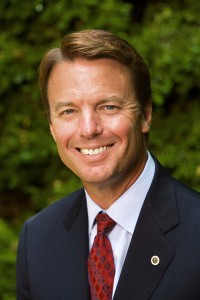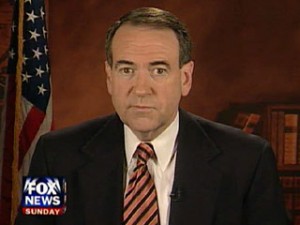 Let’s stipulate that John Edwards’ misdeeds are already legendary. Whatever your view of the linkage between sexual misconduct and public life, Edwards picked an usually sordid path to travel–the betrayal of a dying spouse, the failure to own up to a pregnancy, and a political cover-up that traded on the loyalty of people who believed in him deeply.
Let’s stipulate that John Edwards’ misdeeds are already legendary. Whatever your view of the linkage between sexual misconduct and public life, Edwards picked an usually sordid path to travel–the betrayal of a dying spouse, the failure to own up to a pregnancy, and a political cover-up that traded on the loyalty of people who believed in him deeply.
But sin is still not criminal, and I am in the camp that thinks the prosecution of Edwards last week is misguided.
These are the basic facts around the case: in 2007 and 2008, several major Edwards donors funneled just under a million dollars to Edwards for the purpose of paying off Realle Hunter, Edwards’ mistress, in the hope that she would remain silent about the affair. The Edwards campaign did not disclose the money in its quarterly FEC filings, and there has been much subsequent wrangling over whether they should have.
Whether the money should have been revealed turns largely on how it is classified: gifts need not be reported to the FEC, campaign contributions must be. If the funds had a political purpose like preserving Edwards’ candidacy from scandal, they are arguably campaign contributions. If they were political, they also might be what campaign law calls independent expenditures, and in that case, it would be a campaign finance law violation if Edwards “coordinated” the expenditures in any way.
 The Edwards camp responds that the money, which came from two longtime friends of the former Senator, was a personal gift meant to help Edwards by shielding his wife and family from finding out about the affair. In its charging, the Department of Justice contends that the Edwards team is wrong and that its receipt of the money, which is way outside the legal limits for individual contributions, and its subsequent failure to disclose it, are criminal violations. Edwards alone has been charged.
The Edwards camp responds that the money, which came from two longtime friends of the former Senator, was a personal gift meant to help Edwards by shielding his wife and family from finding out about the affair. In its charging, the Department of Justice contends that the Edwards team is wrong and that its receipt of the money, which is way outside the legal limits for individual contributions, and its subsequent failure to disclose it, are criminal violations. Edwards alone has been charged.
Again, a concession is in order: a candidate’s receipt of sizable amounts of money from a few sources is not a good thing for those of us who worry about the sway big money donors have on politics. Moreover, the idea that money has either a “political” or a “personal” purpose is a rather obvious fiction: keeping an extramarital affair out of view helps save both a marriage and a political career.
But imagine a scenario that is slightly less salacious. Let’s say a major cable television network pays a potential presidential candidate a significant salary to host a program on public affairs, and regularly features that candidate as a commentator on its other programming. The candidate has no previous experience as a journalist and the show performs poorly enough in the ratings that the network derives little benefit. Is this generosity a campaign contribution, on the grounds that the free time and the salary boost the candidate’s presidential interests in obvious ways, and spares him the inconvenience of a day job? Or is it just an act of kindness meant to sustain a figure whose views are shared by the network’s management?
 Whatever it is, this is essentially the arrangement Fox News Channel has had with Mike Huckabee over the last half year, when he was a potential presidential contender. It is certainly a well-connected public man who is accessing ties and relationships based on his status, exactly the core conduct the prosecution attributes to John Edwards. As best we know, the Huckabee/Fox News relationship has attracted no scrutiny from federal election officials or prosecutors, and no one has seriously suggested it should.
Whatever it is, this is essentially the arrangement Fox News Channel has had with Mike Huckabee over the last half year, when he was a potential presidential contender. It is certainly a well-connected public man who is accessing ties and relationships based on his status, exactly the core conduct the prosecution attributes to John Edwards. As best we know, the Huckabee/Fox News relationship has attracted no scrutiny from federal election officials or prosecutors, and no one has seriously suggested it should.
If this sounds strained, think about another example. A group of deep pocketed corporate donors decide they are opposed to a particular presidential candidate’s aspirations and they are motivated enough to spend millions to produce and disseminate an unflattering documentary about her. The specific identity of these donors is not disclosed.
Of course, this is the very event the Supreme Court sanctioned in the controversial Citizens United ruling a year ago. Is this shadowy movement of money in Citizens United or the infusion of cash to Edwards’ mistress a deeper threat to transparency and democratic values? Why is one a criminal case and the other something constitutional lawyers argue about?
Sorting out the boundaries of campaign finance law is a necessary burden, but it is normally the regulators at the FEC and not federal prosecutors who have the responsibility. Had Edwards’ benefactors chosen to pay for ads blasting Barack Obama and Hillary Clinton, and the payments had been kept off the books, there is every likelihood that that the FEC would have the matter all to itself and a criminal investigation never would have emerged. (That is what happened after 1988 when the FEC deadlocked on allegations that the Willie Horton attack ads were an illegal, coordinated expenditure on behalf of George H.W. Bush’s campaign).
There are some commentators who have greeted the Edwards indictment with relief because it is a rare public corruption case for an Administration that has brought so few. The problem is that charging decisions should never turn on a desire to even out a balance sheet. Nor is charging a shattered figure whose reputation is already destroyed much of a badge of courage. Corruption cases should serve a public purpose, and the most powerful prosecutions bring down the entrenched who have abused their power today and would abuse it again tomorrow. That hardly describes what is left of John Edwards.
So, shed no tears for Edwards. But worry about who is in danger next when prosecutors decide that moral outrage matters more than facts.










Leave a Reply